牛津深圳版(广州沈阳通用)九年级英语下Module 1 Explorations and exchanges Unit 1 Great explorations grammar 课件(共24张PPT)
文档属性
| 名称 | 牛津深圳版(广州沈阳通用)九年级英语下Module 1 Explorations and exchanges Unit 1 Great explorations grammar 课件(共24张PPT) |
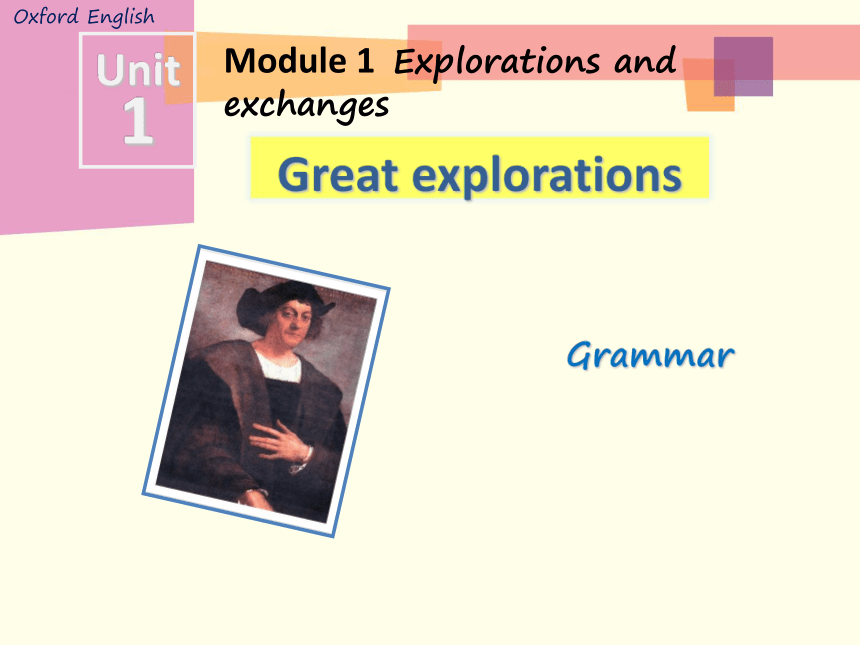
|
|
| 格式 | zip | ||
| 文件大小 | 1.7MB | ||
| 资源类型 | 教案 | ||
| 版本资源 | 牛津深圳版 | ||
| 科目 | 英语 | ||
| 更新时间 | 2020-04-29 00:00:00 | ||
图片预览

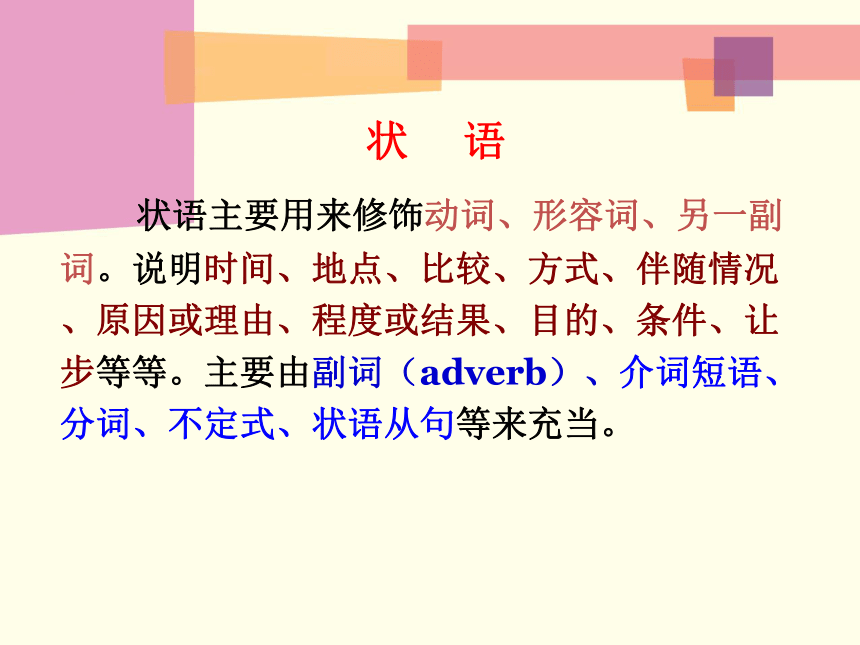
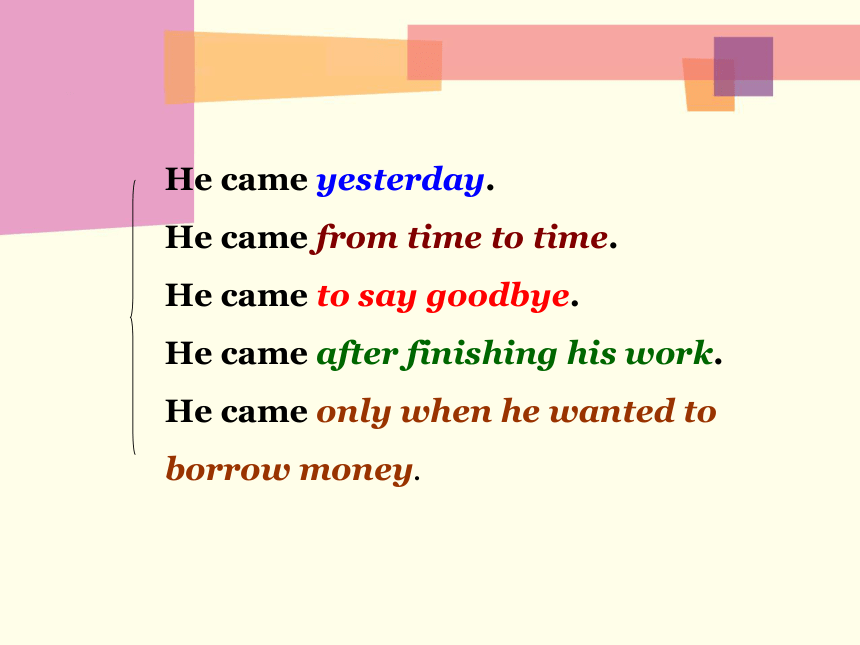
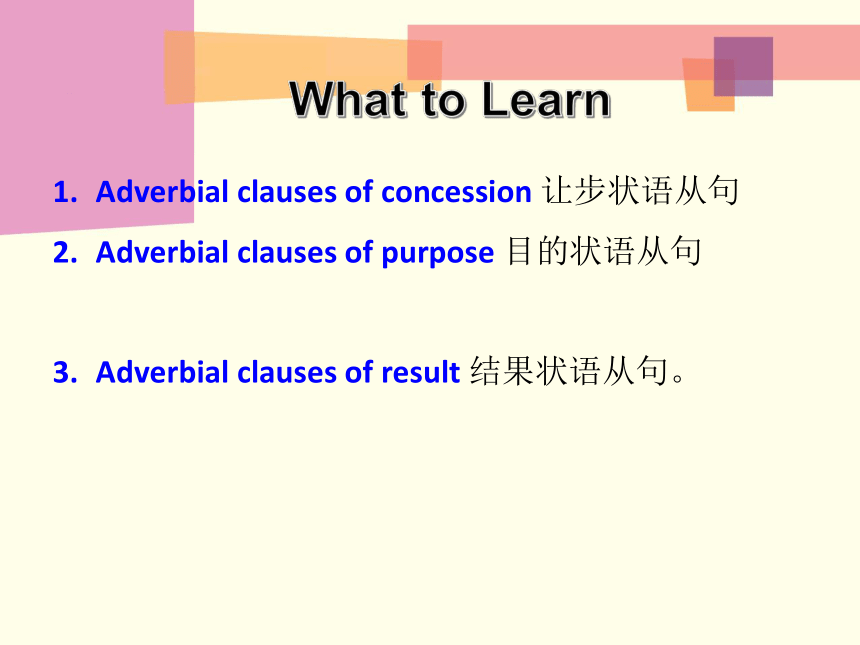
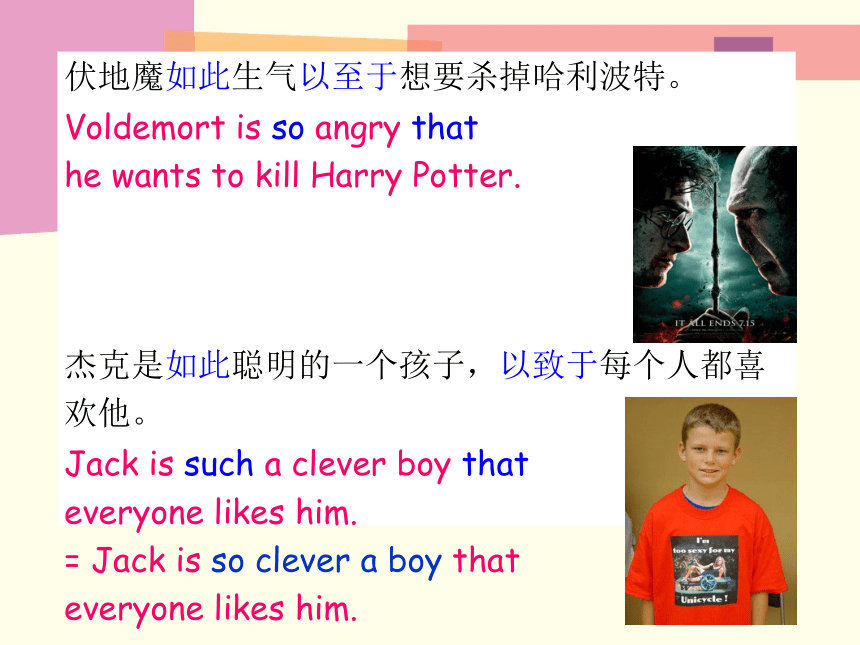
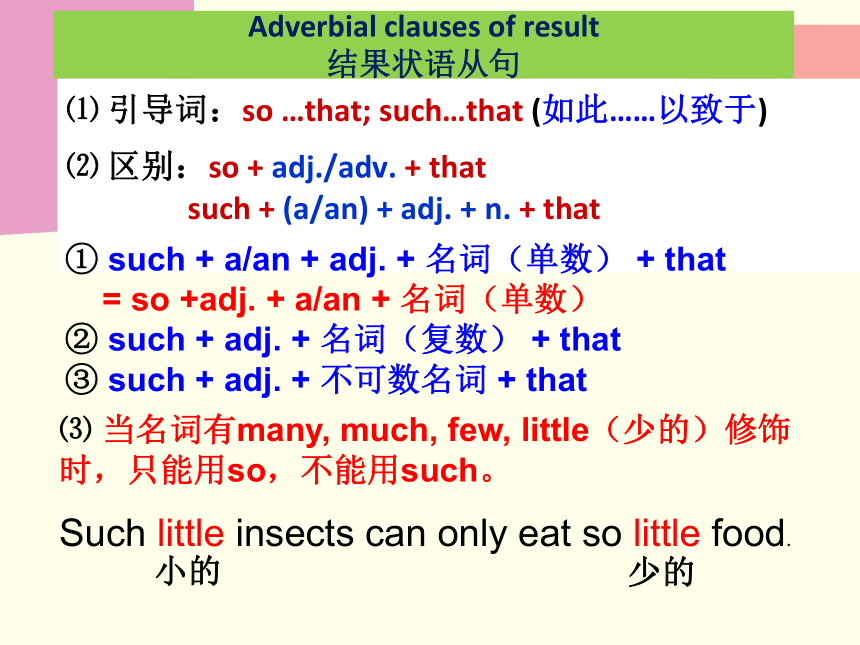
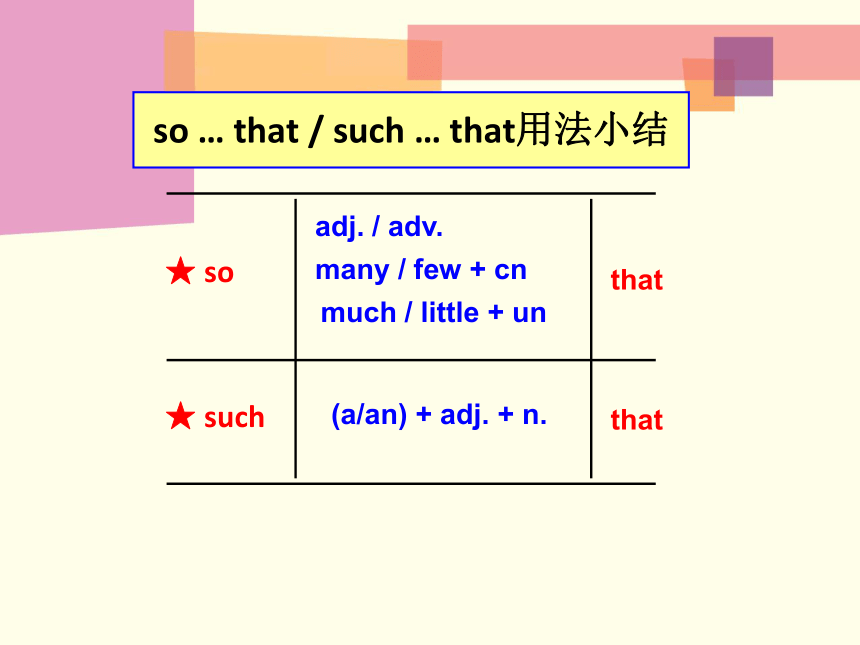
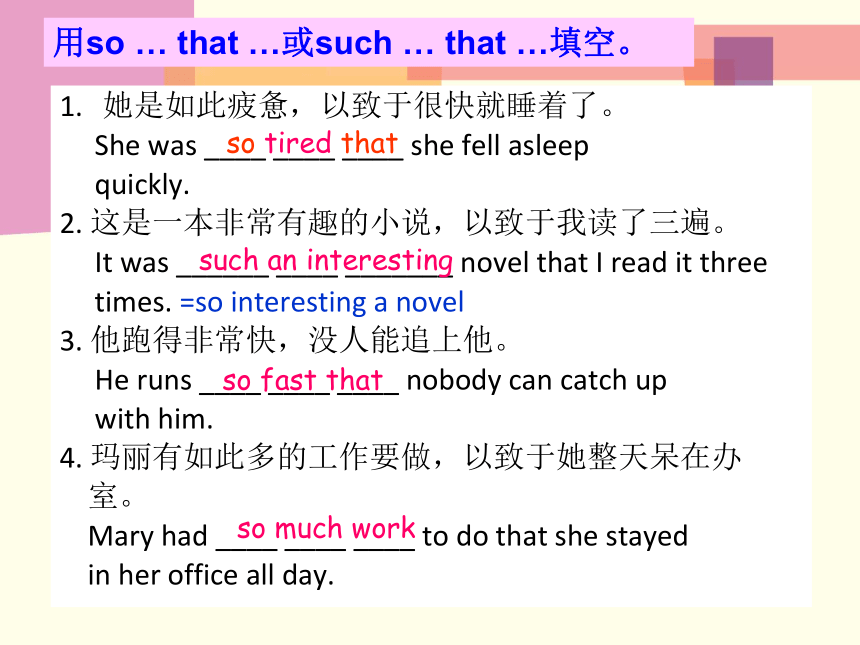
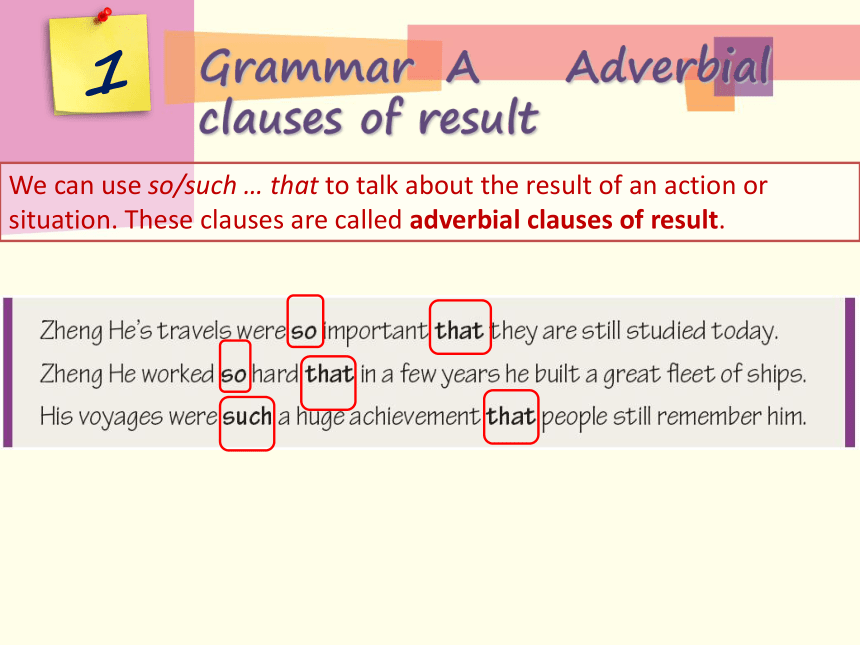
文档简介
课件24张PPT。 GrammarModule 1 Explorations and exchangesOxford EnglishUnit
1 状 语
状语主要用来修饰动词、形容词、另一副词。说明时间、地点、比较、方式、伴随情况、原因或理由、程度或结果、目的、条件、让步等等。主要由副词(adverb)、介词短语、分词、不定式、状语从句等来充当。He came yesterday.
He came from time to time.
He came to say goodbye.
He came after finishing his work.
He came only when he wanted to
borrow money.Adverbial clauses of concession 让步状语从句
Adverbial clauses of purpose 目的状语从句
Adverbial clauses of result 结果状语从句。伏地魔如此生气以至于想要杀掉哈利波特。
Voldemort is so angry that
he wants to kill Harry Potter.
杰克是如此聪明的一个孩子,以致于每个人都喜
欢他。
Jack is such a clever boy that
everyone likes him.
= Jack is so clever a boy that
everyone likes him.
Adverbial clauses of result 结果状语从句⑴ 引导词:so …that; such…that (如此……以致于)
⑵ 区别:so + adj./adv. + that
such + (a/an) + adj. + n. + that
① such + a/an + adj. + 名词(单数) + that
= so +adj. + a/an + 名词(单数)
② such + adj. + 名词(复数) + that
③ such + adj. + 不可数名词 + that⑶ 当名词有many, much, few, little(少的)修饰时,只能用so,不能用such。Such little insects can only eat so little food.小的少的★ soadj. / adv.many / few + cnmuch / little + un★ such(a/an) + adj. + n.thatthatso … that / such … that用法小结她是如此疲惫,以致于很快就睡着了。
She was ____ ____ ____ she fell asleep
quickly.
2. 这是一本非常有趣的小说,以致于我读了三遍。
It was ______ ____ _______ novel that I read it three
times. =so interesting a novel
3. 他跑得非常快,没人能追上他。
He runs ____ ____ ____ nobody can catch up
with him.
4. 玛丽有如此多的工作要做,以致于她整天呆在办
室。
Mary had ____ ____ ____ to do that she stayed
in her office all day. so tired thatsuch an interestingso fast thatso much work用so … that …或such … that …填空。We can use so/such … that to talk about the result of an action or
situation. These clauses are called adverbial clauses of result.1Grammar A Adverbial clauses of resultsosuchThere were _______many people at the party that the house was too crowded.
He had _______little money that he couldn’t afford a car.soso1 This is _______ a difficult Maths problem that nobody in my class can work it out.
2 My sister’s hair is ______ long that it touches her waist.
3 He is _______ strong that he can lift the heavy box alone.
4 I live in _______ a noisy flat that I cannot sleep at night.
5 The ground was _______ hot that you could cook an egg on it.
6 The film was _______ exciting that we were watching
on the edge of our seats. Read the following sentences and fill in the blanks with so or such.suchsososuchsoso2Grammar B too … toWe can use too ... to to talk about results. We sometimes add for + noun/pronoun before to-infinitives.too noisy here for us to talktoo early to go Complete the following conversation with too … to and the words in brackets.too cold for us to sit too afraid to explore1 I’m very sleepy. I can’t do my homework.
2 My grandfather is very old. He can’t travel.
3 I’m very bored. I can’t listen to this lecture any longer.
4 Sally is very tired. She can’t climb the mountain.
5 I was very afraid. I couldn’t move.
Combine the sentences with too … to according to the example.My grandfather is too old to travel.I’m too bored to listen to this lecture any longer.Sally is too tired to climb the mountain.I was too afraid to move. I’m too sleepy to do my homework.
6 Molly was very ill last week. She couldn’t go to school.
7 My pet dog is very fat. It can’t run.
8 My grandmother is very deaf. She doesn’t hear what people say.
Combine the sentences with too … to according to the example.Molly was too ill to go to school last week.My pet dog is too fat to run.My grandmother is too deaf to hear what people say.3Grammar C enough toWe can also use enough to to talk about results.Look at the table and complete the sentences according to the information.is old enough to.1 John is 18. He ____________________ drive a car.2 Alice is 13. She _________________________ drive a car.isn’t old enough to.Look at the table and complete the sentences according to the information.Laurie is not very tall, so he can’t play basketball.
Annie is only 14, so she can’t vote.
I’m very strong. I can carry this heavy box.
My French is good. I can read French novels.
Peter is only four years old. He can’t go out by himself.
Robin is intelligent. He will do well at university.
Rewrite the sentences with enough to according to the example.Laurie is not tall enough to play basketball.Annie is not old enough to vote.I’m strong enough to carry this heavy box.My French is good enough to read French novels.Peter is not old enough to go out by himself.Robin is intelligent enough to do well at university.Alice is so young that she cannot drive a car.
Peter speaks so fast that we are unable to understand.
The weather is so cold that the river freezes.
Alice is too young to drive a car.Peter speaks too fast for us to understand.The weather is cold enough for the river to freeze.Rewrite the adverbial clauses with too … to or enough to..4Alice is not old enough to drive a car.Peter doesn’t speak slowly enough for us to understand.Eddie is so smart that he can work out difficult Maths problems.
Sally ran so fast that she was able to catch that bus.
Betty writes so badly that no one can read her writing.
Eddie is smart enough to work out difficult Maths problems.Sally ran fast enough to catch that bus.Betty writes too badly for anyone to read her writing.Rewrite the adverbial clauses with too … to or enough to.中考链接The book was written in _____ easy English _____ even primary school students could understand it.
A. so, that B. such, that
C. too, to D. very, that
2. Zhou Libo is Shanghai’s favourite funny man. He is good at making people laugh. His lively shows were _____ hot that tickets sold out in minutes.
A. very B. too C. such D. soBD中考链接3. —You study _____ hard _____ you’re sure to pass the exam.
—Thank you for saying so.
A. enough, to B. as, as C. so, that
4. This meeting is _______ important that you mustn’t miss it.
A. very B. such C. so D. tooCC中考链接5. She was _____ angry _____ she couldn’t say a word. A. so, as B. so, that
C. too, to D. very, that
6. — ______ good time we had at the party last night!
—Yes. It was ______exciting party that I would never forget it.
A. What, so B. How, such
C. What a, such an D. How a, so an BC
1 状 语
状语主要用来修饰动词、形容词、另一副词。说明时间、地点、比较、方式、伴随情况、原因或理由、程度或结果、目的、条件、让步等等。主要由副词(adverb)、介词短语、分词、不定式、状语从句等来充当。He came yesterday.
He came from time to time.
He came to say goodbye.
He came after finishing his work.
He came only when he wanted to
borrow money.Adverbial clauses of concession 让步状语从句
Adverbial clauses of purpose 目的状语从句
Adverbial clauses of result 结果状语从句。伏地魔如此生气以至于想要杀掉哈利波特。
Voldemort is so angry that
he wants to kill Harry Potter.
杰克是如此聪明的一个孩子,以致于每个人都喜
欢他。
Jack is such a clever boy that
everyone likes him.
= Jack is so clever a boy that
everyone likes him.
Adverbial clauses of result 结果状语从句⑴ 引导词:so …that; such…that (如此……以致于)
⑵ 区别:so + adj./adv. + that
such + (a/an) + adj. + n. + that
① such + a/an + adj. + 名词(单数) + that
= so +adj. + a/an + 名词(单数)
② such + adj. + 名词(复数) + that
③ such + adj. + 不可数名词 + that⑶ 当名词有many, much, few, little(少的)修饰时,只能用so,不能用such。Such little insects can only eat so little food.小的少的★ soadj. / adv.many / few + cnmuch / little + un★ such(a/an) + adj. + n.thatthatso … that / such … that用法小结她是如此疲惫,以致于很快就睡着了。
She was ____ ____ ____ she fell asleep
quickly.
2. 这是一本非常有趣的小说,以致于我读了三遍。
It was ______ ____ _______ novel that I read it three
times. =so interesting a novel
3. 他跑得非常快,没人能追上他。
He runs ____ ____ ____ nobody can catch up
with him.
4. 玛丽有如此多的工作要做,以致于她整天呆在办
室。
Mary had ____ ____ ____ to do that she stayed
in her office all day. so tired thatsuch an interestingso fast thatso much work用so … that …或such … that …填空。We can use so/such … that to talk about the result of an action or
situation. These clauses are called adverbial clauses of result.1Grammar A Adverbial clauses of resultsosuchThere were _______many people at the party that the house was too crowded.
He had _______little money that he couldn’t afford a car.soso1 This is _______ a difficult Maths problem that nobody in my class can work it out.
2 My sister’s hair is ______ long that it touches her waist.
3 He is _______ strong that he can lift the heavy box alone.
4 I live in _______ a noisy flat that I cannot sleep at night.
5 The ground was _______ hot that you could cook an egg on it.
6 The film was _______ exciting that we were watching
on the edge of our seats. Read the following sentences and fill in the blanks with so or such.suchsososuchsoso2Grammar B too … toWe can use too ... to to talk about results. We sometimes add for + noun/pronoun before to-infinitives.too noisy here for us to talktoo early to go Complete the following conversation with too … to and the words in brackets.too cold for us to sit too afraid to explore1 I’m very sleepy. I can’t do my homework.
2 My grandfather is very old. He can’t travel.
3 I’m very bored. I can’t listen to this lecture any longer.
4 Sally is very tired. She can’t climb the mountain.
5 I was very afraid. I couldn’t move.
Combine the sentences with too … to according to the example.My grandfather is too old to travel.I’m too bored to listen to this lecture any longer.Sally is too tired to climb the mountain.I was too afraid to move. I’m too sleepy to do my homework.
6 Molly was very ill last week. She couldn’t go to school.
7 My pet dog is very fat. It can’t run.
8 My grandmother is very deaf. She doesn’t hear what people say.
Combine the sentences with too … to according to the example.Molly was too ill to go to school last week.My pet dog is too fat to run.My grandmother is too deaf to hear what people say.3Grammar C enough toWe can also use enough to to talk about results.Look at the table and complete the sentences according to the information.is old enough to.1 John is 18. He ____________________ drive a car.2 Alice is 13. She _________________________ drive a car.isn’t old enough to.Look at the table and complete the sentences according to the information.Laurie is not very tall, so he can’t play basketball.
Annie is only 14, so she can’t vote.
I’m very strong. I can carry this heavy box.
My French is good. I can read French novels.
Peter is only four years old. He can’t go out by himself.
Robin is intelligent. He will do well at university.
Rewrite the sentences with enough to according to the example.Laurie is not tall enough to play basketball.Annie is not old enough to vote.I’m strong enough to carry this heavy box.My French is good enough to read French novels.Peter is not old enough to go out by himself.Robin is intelligent enough to do well at university.Alice is so young that she cannot drive a car.
Peter speaks so fast that we are unable to understand.
The weather is so cold that the river freezes.
Alice is too young to drive a car.Peter speaks too fast for us to understand.The weather is cold enough for the river to freeze.Rewrite the adverbial clauses with too … to or enough to..4Alice is not old enough to drive a car.Peter doesn’t speak slowly enough for us to understand.Eddie is so smart that he can work out difficult Maths problems.
Sally ran so fast that she was able to catch that bus.
Betty writes so badly that no one can read her writing.
Eddie is smart enough to work out difficult Maths problems.Sally ran fast enough to catch that bus.Betty writes too badly for anyone to read her writing.Rewrite the adverbial clauses with too … to or enough to.中考链接The book was written in _____ easy English _____ even primary school students could understand it.
A. so, that B. such, that
C. too, to D. very, that
2. Zhou Libo is Shanghai’s favourite funny man. He is good at making people laugh. His lively shows were _____ hot that tickets sold out in minutes.
A. very B. too C. such D. soBD中考链接3. —You study _____ hard _____ you’re sure to pass the exam.
—Thank you for saying so.
A. enough, to B. as, as C. so, that
4. This meeting is _______ important that you mustn’t miss it.
A. very B. such C. so D. tooCC中考链接5. She was _____ angry _____ she couldn’t say a word. A. so, as B. so, that
C. too, to D. very, that
6. — ______ good time we had at the party last night!
—Yes. It was ______exciting party that I would never forget it.
A. What, so B. How, such
C. What a, such an D. How a, so an BC
